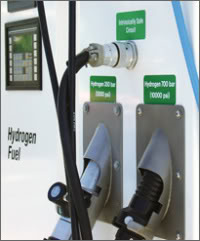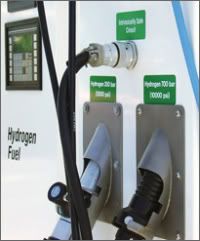Hydrogen – Back Like a Rash


The science: Hydrogen in its pure form is rare, because it combines so readily with other substances, releasing energy in the process. It can be burned (combining it with oxygen to form water) or used in a fuel cell, (i.e., pulling the electron off and moving it through a separate electrical path from its proton, again, ultimately combining with oxygen). But energy is required to create this pure hydrogen such that we can then harvest useful work from these processes. And the mechanisms by which hydrogen is generated (e.g., electrolysis) and then the energy is gathered from burning or fuel cells are three times less efficient than the standard mechanisms by which electrical energy is generated, stored in batteries, and then converted back into useful work through electric motors.
The business: It is true that civilization will face issues in building out the electrical grid to provide ultimately a complete network of convenient and safe charging stations for electric vehicles. But the electrical grid has a 130-year headstart on whatever delivery mechanism is proposed to serve up hydrogen over the enormity (3.5+ million squares miles) of a place like the United States. In addition to being far more efficient, electrical energy is already available in the vast majority of homes and work places.
The politics: In my opinion, the idea that we should take an inefficient carrier of energy and use to to create “hydrogen highways” could only have come from someone who really doesn’t want alternative fuels ever to see the light of day, and is disguising this malice in a not-too-clever way. And those of you who have seen “Who Killed The Electric Car” will recognize that this is hardly an original idea.
Not too long ago, it appeared that the powers of reason and decency had made their case effectively, and this distraction had been shelved; in fact, Energy Secretary Steven Chu’s DoE defunded hydrogen at the federal level earlier this year. But it’s back with a vengeance. For example, California, while teetering on the edge of bankruptcy, is subsidizing the hydrogen highway with public funds.
And ask yourself why this is happening, and who will be delivering this hydrogen (assuming it ever happens). ExxonMobil and Chevron. Hey, guys: You make $10 billion in profit each quarter. If you really want this to happen, do you mind paying for it yourselves? How dare you ask the taxpayers to pay for this folly, when you and only you will profit from it — on the off chance that it ever happens?
There you have it, the 1-2-3 of hydrogen energy. If only it were that easy to make it go away.
